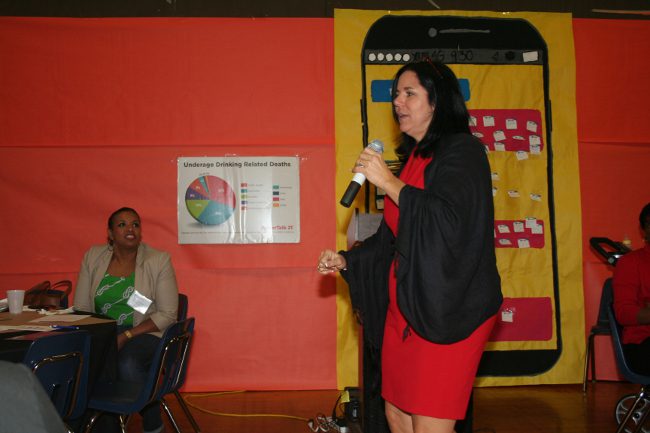 Ashley, a senior at South Miami High School, has two brothers who wound up in prison and another who died. She sees some of her schoolmates making poor decisions, getting in trouble, and tunneling towards their own dead-end.
Ashley, a senior at South Miami High School, has two brothers who wound up in prison and another who died. She sees some of her schoolmates making poor decisions, getting in trouble, and tunneling towards their own dead-end.
“I saw that in my family and didn’t want to turn out like that – I wanted to set a goal for my life,” Ashley said. And this young woman has. The captain of the South Miami Police Explorers, she mentors other students while learning about laws and law enforcement. She’s on track to graduate and plans for a career as a police officer.
Ashley and a dozen high school students spent a half day sharing concerns with adult community leaders and youth advocates at Youth Dialogue Day, held in late January at South Miami High and hosted by the South Miami Drug Free Coalition. For the youth, the session offered a chance to talk about the tensions and pressures at school, at home and in the community. For the adults, it was a chance to listen and gain perspective on how best to guide youth through the treacherous teen years.
Margaret Prinzavalli Sotham, executive director of the Coalition, facilitated this fourth Youth Dialogue Day. “
We believe that we understand what young people are struggling with and what they’re facing. But we’re not teens anymore. So today is about listening and getting to know where these remarkable young people are on their journey,” said Prinzavalli Sotham. “You students have a voice. The challenge is figuring out how to use it – and to whom – and today the whom is in the room.
Concerns were divided into four areas: academic performance and pressure; safety at school; access to and pressures to use drugs and alcohol; and student involvement and volunteerism. Each session was geared to move from exploring the problem to mining for solutions.
 Victor and Vania, both seniors at South Miami, worry that security guards are “too trusting” and that security is lax, though they admitted that they generally felt safe at school and had not witnessed instances to make them fearful. They realized that incidents at other schools that they’d heard about might have influenced their concerns.
Victor and Vania, both seniors at South Miami, worry that security guards are “too trusting” and that security is lax, though they admitted that they generally felt safe at school and had not witnessed instances to make them fearful. They realized that incidents at other schools that they’d heard about might have influenced their concerns.
They talked about two “groups” of students at the school: the students who were studying, doing well and aiming for college, and the “bad kids.”
“Everybody wants to have fun, but there are some kids who are disruptive, they’re just interested in having a good time,” Vania said. She added that these teens usually come from families that don’t seem to care much about them or pay attention to what they do.
Victor said the school administration’s decision to remove school lockers, where some students would sometimes hide banned items, and the move from one long lunch session to two shorter ones meant fewer students in the cafeteria, shorter lines and less idle time – had improved the safety situation.
South Miami Principal Gilbert Bonce, a big advocate of Youth Dialogue Day, responded to some of the student perspectives.
“We’re unique in that we don’t have gang or race issues – and there’s a small percentage of students that causes a large percentage of the problems. Yet these ‘bad’ kids are part of a bigger societal problem – the lack of parental involvement.”
Bonce explained that school budget cuts had required him to let go of guidance and trust counselors who would otherwise be on hand to help youth who needed help.
“I only have four counselors – and each is responsible for over 500 students. I have an incredible staff that does amazing work. At the end of a long day, they’re exhausted because that’s tough emotional work,” said Bonce, principal for eight years at South Miami. “Funding cuts are huge – I have a certain budget to buy and to take care of everything – from toilet paper to staff,” he said.
“If I had $60,000 more in my budget I would definitely invest in more counselors. It’s critical because for some kids because their lives at home are a mess. School for them is a safe place for seven hours.”
Students from South Miami Middle School’s Street to Stage drama team performed “Identity Theft,” a play that dramatically explore pressures and conflicts that many young people face. The play is the outgrowth of a 14-week school curriculum that emphasizes journaling and writing to help pre-teens improve decision-making, manage anger, and resist negative behaviors.
“When we started rehearsing, I was able to find solutions for everyone’s problems and conflicts, but not for my own. Through the play, I had to find my own new identity,” said Selene, one of the young actors.
Rafael, a sophomore at South Miami, attended a meeting of the Drug Education for Youth (DEFYIT) program a few years ago – he was most interested in the free food offered.
He liked what he heard and decided to stick with the mentoring program that promotes positive role models. It’s become a major positive influence in his life. Rafael has been the club president for the past four years and enjoys helping younger students, taking field trips to do community service and learning about leadership.
Access to drugs and alcohol is easy for teens, he says, and they find untold ways to bring the substances onto the high school campus – regardless the consequences and the risks they take.
“The administration has made some good changes – split lunches, did away with lockers. So there’s been a decrease in problems and drug use, but kids always find a way. They can hide it in their cars – you can’t prevent it,” Rafael said. “At the end of the day it’s the person’s initiative. It all depends on the person, on their decisions – you can’t get into their heads.
Laura Thompkins teaches anatomy and physiology at South Miami and has been the advisor for four years of Cobra Awesome, an after-school club that teaches good decision-making.
“So many of these kids are such good kids, we really believe in them. In the club we teach them that they can be young and have fun – that’s part of being young. And it’s important to make good decisions. They can enjoy their youth without following down the wrong path,” Thompkins said.






